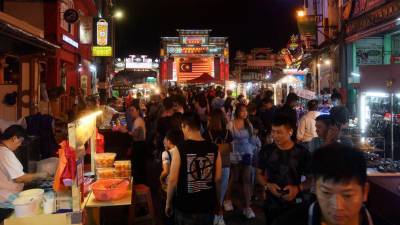PETALING JAYA: The proposal to develop a comprehensive night-time economy in Malaysia, inspired by policies adopted in global cities, has sparked mixed reactions among lawmakers.
Bukit Bendera MP Syerleena Abdul Rashid welcomed the idea, noting that such policies have proven effective elsewhere in managing nightlife, boosting tourism and improving safety after dark.
However, she dismissed the need for night mayors – a practice seen in Amsterdam, Sydney and London – arguing that local councils and existing mayors should shoulder the responsibility.
“Each council understands the unique social dynamics and cultural sensitivities of its own area. What works for a nightlife-heavy city like Amsterdam or Sydney may not automatically apply in Penang, Kuala Lumpur or Johor Bahru.
“Local councils already have the mandate to regulate entertainment, licensing and community wellbeing. Strengthening their capacity, rather than creating another bureaucratic layer, may be the more practical solution,” she told theSun via WhatsApp.
Machang MP and former cabinet member Wan Ahmad Fayhsal Wan Ahmad Kamal also acknowledged the potential of a night-time economy but questioned the need for new positions to manage it.
“I don’t feel it’s necessary, as night-time economic activity is not as complex as daytime operations.”
He suggested existing regulations could be sufficient, with the option of imposing surcharges on operators to fund monitoring and services during night hours, subject to legal amendments.
Shah Alam MP Azli Yusof took a more cautious stance, stressing that Malaysia is not yet ready for a full-scale 24-hour economy.
“In my opinion, Malaysia is not yet ready to implement such a concept. We need thorough studies that consider business demand, worker welfare and safety, infrastructure and logistics, social impacts and whether residents’ quality of life could be affected.”
Adding context, a July study by Khazanah Research Institute (KRI) titled “Night Markets: A Bigger Role to Play in Tourism” highlighted that night markets have been part of Malaysia’s landscape since pre-independence, although they remain concentrated in urban hotspots.
“Back in the 1960s, night markets were mostly found in city centres and tourist destinations like Kuala Lumpur and Selangor,” said KRI researcher Nur Sofea Hasmira Azahar.
The report also noted that global studies show tourists frequently search for terms related to “shopping” and “food experiences” when browsing destination websites.
“This trend closely aligns with Malaysia’s tourism landscape, where the top three categories of tourism expenditure are shopping, accommodation, and food and beverages. Based on such developments, night markets could contribute significantly to spending in food and retail.”
According to KRI, tourism – including spending at night markets – contributed about 15% of Malaysia’s gross domestic product in 2023.
Nur Sofea suggested Malaysia look to Taiwan’s model, where night markets have been transformed into major tourist attractions, generating strong economic returns.
She said Malaysia could adopt a similar approach by upgrading infrastructure, raising vendor standards and promoting selected night markets that highlight the country’s multicultural identity through food and culture.
“Perhaps these efforts could be strategically aligned with Visit Malaysia 2026, which celebrates the richness of Malaysian culture, and supported through the RM550 million allocated for the tourism sector under Budget 2025.”
